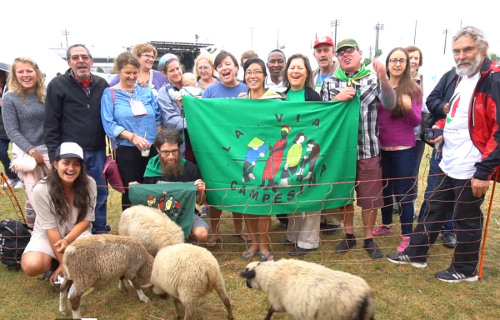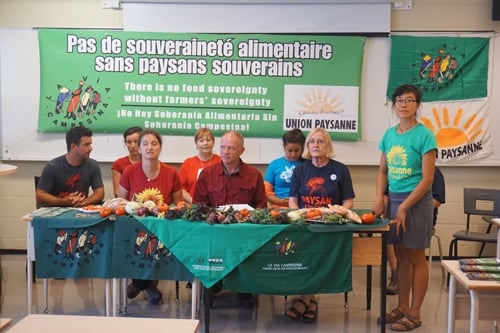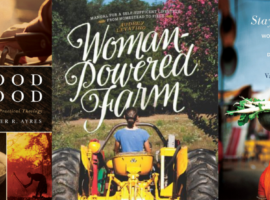This piece was originally published by La Via Campesina.
The World Social Forum, held this month in Montreal, brought together thousands of activists, organizations and social movements working to build a sustainable and inclusive world, to learn, strategize and share knowledge with each other. With so many organizers, farmers, activists, students and change makers in one place, it was easy to see the collective strength of the movement and the potential for the type of transformative social change that our world needs. The power of this potential was crystal clear at a briefing held by Quebec’s Union paysanne and La Via Campesina on the struggle of small-scale farmers in Quebec.
Union paysanne, or Peasant Union, was formed by a group of concerned farmers, consumers and activists that have been organizing in Quebec since 2001 to advocate for agricultural reform across the province. The goals of the movement – clearly articulated in their policy platform – include defending the rights of small scale farmers and organic production, advocating for access to land, food sovereignty and fair trade principles, and combating the corporate control of seeds, land and access to resources, including the refusal of GMOs and dependency on industrial agriculture. As Benoit Girouard, president of Union paysanne and a beekeeper and farmer explained, the main issue in Quebec is “the fight for access and control of our local resources for the local people.”

For years, Union paysanne members have been organizing to break the monopoly of the Union of Agricultural Producers (UPA) over the representation of farmers in Quebec. As Stephanie Wang and Laurence Barchichat, new farmers and coordinators of Union paysanne declared at the briefing, “Quebec cannot guarantee its food sovereignty without having a sovereign peasantry. The union monopoly of the UPA is a major obstacle to human-scale, respectful agriculture.”
The law in Quebec requires mandatory participation by small-scale farmers and producers in the UPA, which supports heavy regulations that make it hard for small farmers and producers to sell at markets and to have a viable, sustainable lifestyle in agriculture. According to Union paysanne, only 1% of the population in Quebec now works in agriculture; meanwhile 80% of agriculture land is not being cultivated because new, small-scale farmers and young farmers face restrictions to buy or access land. Most of the land is being shifted to large scale, corporate mono-culture facilities that are producing soy and canola. These and other barriers make it difficult for small-scale farmers to survive.





